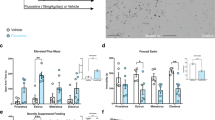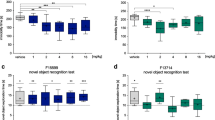Abstract
Antidepressant agents have been proven their utilities in treating depression, but they also could serve as candidate drugs for misuse or abuse due to diverse pharmacologic properties. Potential detriments had also been multidimensionally investigated. However, there had been no study exploring whether treatment with antidepressants causes psychological and/or behavioral alterations in offspring. In this regard, we chronically treated normal female mice with different dosages (0, 10, and 20 mg/kg) of fluoxetine (FLU) for 2 weeks before mating them with drug-free male mice and then tested the offspring for anxiety/depression-like behaviors with the elevated plus maze and the tail-suspension test after exposing to acute or chronic stress in adult period. We found that there were significant increases for immobility time in the tail-suspension test as well as percentage of open arm entries and percentage of open arm time in the elevated plus maze test detected in the female offspring of the 20 mg group compared to both baseline and all other groups, with the exception that the female offspring of the 10 mg group showed an increased percentage of open arm entries after chronic stress exposure. Locomotor activity assessments showed that neither acute nor chronic stress protocol could significantly affect locomotor activities of mice. Conclusionally, we found that high-dosage FLU increased the risk of the female offspring developing into depression/anxiety-like behaviors after stress exposure, with chronic stress as the environmental-risk factor. Our study has important implications for the safe use of antidepressant agents and raises more concerns regarding long-term use of even second-generation antidepressants in clinical practice.






Similar content being viewed by others
References
Baek IS, Park JY, Han PL (2015) Chronic antidepressant treatment in normal mice induces anxiety and impairs stress-coping ability. Exp Neurobiol 24:156–168. https://doi.org/10.5607/en.2015.24.2.156
Clark MS, Jansen K, Bresnahan M (2013) Clinical inquiry: how do antidepressants affect sexual function? J Fam Pract 62:660–661
Crane EH (2013) Highlights of the 2011 Drug Abuse Warning Network (DAWN) findings on drug-related emergency department visits. In: The CBHSQ Report. Substance Abuse and Mental Health Services Administration (US), Rockville (MD), pp 1– 9
Drapier D, Bentue-Ferrer D, Laviolle B, Millet B, Allain H, Bourin M, Reymann JM (2007) Effects of acute fluoxetine, paroxetine and desipramine on rats tested on the elevated plus-maze. Behav Brain Res 176:202–209. https://doi.org/10.1016/j.bbr.2006.10.002
Evans EA, Sullivan MA (2014) Abuse and misuse of antidepressants. Subst Abus Rehabil 5:107–120. https://doi.org/10.2147/sar.s37917
Fink G, Sumner BE (1996) Oestrogen and mental state. Nature 383:306. https://doi.org/10.1038/383306a0
Fink G, Sumner BE, Rosie R, Grace O, Quinn JP (1996) Estrogen control of central neurotransmission: effect on mood, mental state, and memory. Cell Mol Neurobiol 16:325–344
Gibbons RD, Coca Perraillon M, Hur K, Conti RM, Valuck RJ, Brent DA (2015) Antidepressant treatment and suicide attempts and self-inflicted injury in children and adolescents. Pharmacoepidemiol Drug Saf 24:208–214. https://doi.org/10.1002/pds.3713
Hanley GE, Oberlander TF (2014) The effect of perinatal exposures on the infant: antidepressants and depression. Best Pract Res Clin Obstet Gynaecol 28:37–48. https://doi.org/10.1016/j.bpobgyn.2013.09.001
Ilyas S, Moncrieff J (2012) Trends in prescriptions and costs of drugs for mental disorders in England, 1998–2010. Br J Psychiatr 200:393–398. https://doi.org/10.1192/bjp.bp.111.104257
Kutanzi K, Kovalchuk O (2013) Exposure to estrogen and ionizing radiation causes epigenetic dysregulation, activation of mitogen-activated protein kinase pathways, and genome instability in the mammary gland of ACI rats. Cancer Biol Ther 14:564–573. https://doi.org/10.4161/cbt.24599
Mandour RA (2012) Antidepressants medications and the relative risk of suicide attempt. Toxicol Int 19:42–46. https://doi.org/10.4103/0971-6580.94517
Mutlu O et al (2012) Effects of fluoxetine, tianeptine and olanzapine on unpredictable chronic mild stress-induced depression-like behavior in mice. Life Sci 91:1252–1262. https://doi.org/10.1016/j.lfs.2012.09.023
Robison AJ et al (2014) Fluoxetine epigenetically alters the CaMKIIalpha promoter in nucleus accumbens to regulate DeltaFosB binding and antidepressant effects. Neuropsychopharmacology 39:1178–1186. https://doi.org/10.1038/npp.2013.319
Shi HS, Yin X, Song L, Guo QJ, Luo XH (2012) Neuropeptide Trefoil factor 3 improves learning and retention of novel object recognition memory in mice. Behav Brain Res 227:265–269. https://doi.org/10.1016/j.bbr.2011.10.051
Silva RC, Brandao ML (2000) Acute and chronic effects of gepirone and fluoxetine in rats tested in the elevated plus-maze: an ethological analysis. Pharmacol Biochem Behav 65:209–216
Teyssier JR, Ragot S, Chauvet-Gelinier JC, Trojak B, Bonin B (2011) Activation of a DeltaFOSB dependent gene expression pattern in the dorsolateral prefrontal cortex of patients with major depressive disorder. J Affect Disord 133:174–178. https://doi.org/10.1016/j.jad.2011.04.021
Verma R, Balhara YP, Gupta CS (2011) Gender differences in stress response: role of developmental and biological determinants. Ind Psychiatr J 20:4–10. https://doi.org/10.4103/0972-6748.98407
Vialou V et al (2014) Prefrontal cortical circuit for depression- and anxiety-related behaviors mediated by cholecystokinin: role of DeltaFosB. J Neurosci 34:3878–3887. https://doi.org/10.1523/jneurosci.1787-13.2014
Wade D, Varker T, Kartal D, Hetrick S, O’Donnell M, Forbes D (2016) Gender difference in outcomes following trauma-focused interventions for posttraumatic stress disorder: Systematic review and meta-analysis. Psychol Trauma Theory Res Pract Policy 8:356–364. https://doi.org/10.1037/tra0000110
Acknowledgements
This work was supported by grants from “Tianjin Nature Science Foundation” (16JCYBJC24200) and “Key Program for Tianjin Health Committee” (13KG118).
Author information
Authors and Affiliations
Corresponding author
Ethics declarations
Conflict of interest
The authors declare that they have no competing interests.
Ethical approval
All applicable guidelines for the care and use of animals were followed. All experimental procedures were approved by the Animal Use Committee of Peking University Health Center.
Additional information
Publisher's Note
Springer Nature remains neutral with regard to jurisdictional claims in published maps and institutional affiliations.
Rights and permissions
About this article
Cite this article
Yang, C., Si, J., Suo, L. et al. Chronic exposure to fluoxetine of female mice before mating causes impaired stress resilience in female offspring. J Neural Transm 126, 1231–1239 (2019). https://doi.org/10.1007/s00702-019-02047-3
Received:
Accepted:
Published:
Issue Date:
DOI: https://doi.org/10.1007/s00702-019-02047-3




